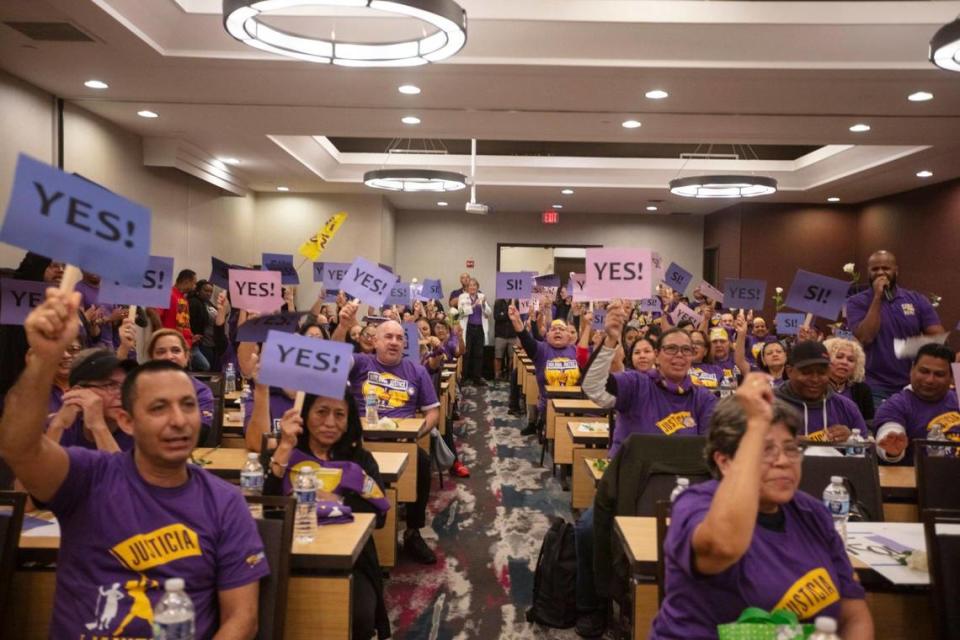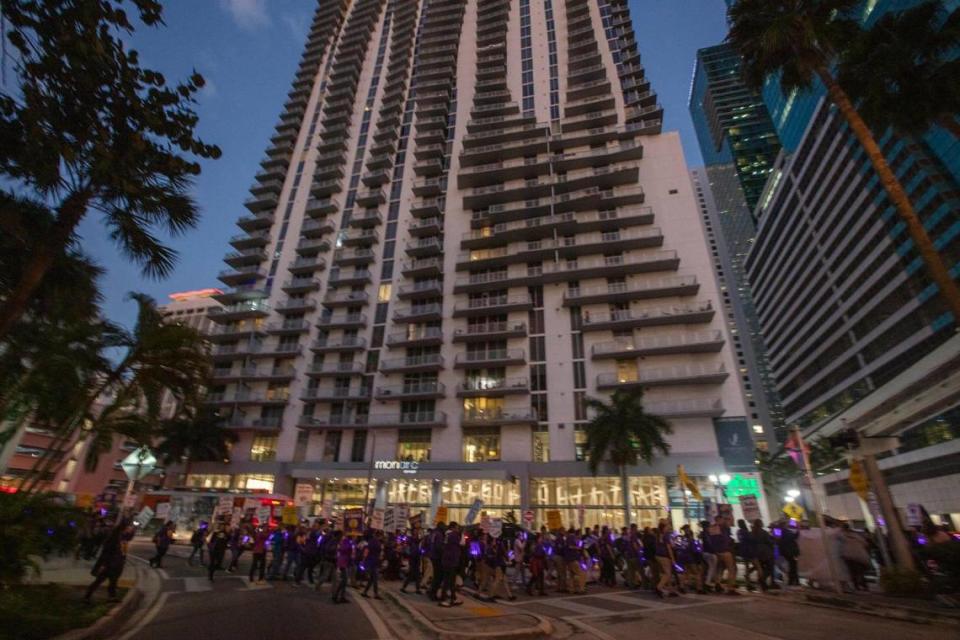Janitors who clean South Florida’s offices, many of them immigrants, fight for higher wages
On a recent evening, scores of janitors donned matching purple shirts as they marched across downtown Miami shortly after voting for their union leadership to call a strike if necessary.
They held up posters in Spanish and English over their heads, asking for “justice” and “fair pay.” Some of the workers held white roses as they protested across the business district where many of them clean offices.
A mariachi band accompanied the protesters, representing the fighting spirit of the South Florida cleaners in song, and sometimes serenading in forceful language: Deja el mapo y la escoba, que es la hora de luchar… contra los patrones nos vamos a levantar.
“Put down the mop and the broom, it’s time to fight... against the bosses we are going to rise,” belted the group.
The protesters are part of 32BJ SEIU, a janitors’ union that formally organized in South Florida in 2021. The labor group says it represents about 1,500 workers who provide services in almost 80% of the buildings in downtown Miami and Fort Lauderdale.
And the majority of the union members — currently fighting for higher wages, more full-time positions, and more holidays and paid time off — are immigrant women.
“We are all on the same boat. We are immigrants who come from our countries for the American Dream,” said union leader Vanesa Gándara.
The union is set to resume contract negotiations on Tuesday. The current agreement with more than a dozen contractors and companies expires this week. A report released in January by 32BJ SEIU which analyzed federal government data found that, at $13.32 an hour, Miami metro area janitorial wages are the lowest among several U.S. metropolitan areas.
“If we don’t negotiate, if they don’t pay us what we deserve, we aren’t going to clean anymore,” said Gándara of the strike vote, which authorizes the union’s bargaining team to stop work if no agreement is reached.

The report argues that the South Florida commercial real estate market is thriving, and given the high living and housing costs that janitors shoulder, they should be paid more. Workers interviewed for the story said that wages and work conditions have improved since entering their first contract with employers in 2022. The Miami Herald reached out to some of the companies on Monday, but none responded to requests for comment.
Gándara came to the U.S. from Argentina two decades ago. She cleans houses and also has a part-time job as a janitor in Doral. She spends about 14 hours a day working and commuting, a sacrifice she makes to give her children the best opportunities in their adopted country.
But after she and her husband were unable to fully cover their bills, their eldest son, now 25, withdrew from college to help. He now works as a security guard. Meanwhile, Gándara’s 15-year-old daughter is studying so she can get scholarships to for college. She hopes to become a lawyer one day.
Gándara’s son wants to go back to school. But it’s an uphill battle on the family’s wages.
“Many people here in Miami don’t know the conditions of cleaning workers. They come to the office the next day and everything is clean,” said Gándara, “That’s why we took to the streets. So they hear us, because the famous American Dream can be pretty unjust.”
Most Miami-Dade essential workers are immigrants
32BJ SEIU conducted a a survey of more than 200 janitors for its January report. It found that 98% of its members in South Florida are foreign-born, while 97% identify as Hispanic or Latino. The union’s workers mainly hail from countries in Latin America and the Caribbean, including Nicaragua, Honduras and Cuba. Most have been in the United States for a long time, according to the labor organization. But the group estimates that between 30 and 40 percent have been here for three years or less, part of a wave of recent arrivals looking to make a life in South Florida.
The composition of the union’s membership is also reflective of Miami-Dade’s labor trends. A June 2021 survey from Miami-Dade’s Office of New Americans found that people born outside the U.S. made up 80% of the essential services workforce, which includes building cleaning, waste management, auto repair, and veterinary services. In all, the survey reported that while the county’s foreign-born population is 54.7%, immigrants made up 65% of the employed population.

Immigrants also made up the bulk of the workforce in industries such as agriculture, general services, manufacturing, finance, hospitality, healthcare and social assistance, and construction, according to the county office survey.
Miami-Dade County Mayor Daniella Levine Cava met with members of 32BJ SEIU last month to show support for their labor fight.
“These contract negotiations are about ensuring that the economic success of Downtown is also felt in Little Havana, Hialeah, Homestead, and other neighborhoods where hardworking janitors live. This contract is about raising standards for thousands of working families that keep our Country clean every day,” said Levine Cava in a statement.
“They don’t speak up for fear of losing their job”
The day-to-day work of the janitors is arduous. They often arrive at their workplaces late in the day, once the office workers have left and the air conditioning has been turned off. They clean bathrooms and kitchens, and throw out heavy garbage bags filled with food scraps and office supplies.
“It’s tough work,” said Aurora Mendoza, 58, another union member from the Nicaraguan capital of Managua, “Some part-time workers will have four hours to clean three floors.”
Mendoza said that sometimes cleaners can be afraid to speak up on the job because they feel vulnerable as immigrants. The janitors have all kinds of immigration statuses, ranging from Temporary Protected Status to citizenship. The workers report their wages to the federal government and get taxes withheld, said the group’s communications manager.
“There are people who only have a work permit. They are the ones who are more afraid to assert their rights,” said Mendoza, “They don’t speak up for fear of losing their job.”
Mendoza came to the U.S. after Hurricane Mitch devastated Central America and killed more than 11,000 people in late 1998. She didn’t have a stable job, and her mother was out of work. She found a gig cleaning as a house cleaner and planned to stay half a year in Miami.
Six months turned into 25 years. Today, Mendoza is a cleaner at a gym in Brickell. She disinfects the gym equipment, washes towels and keeps the bathroom sinks and floors dry. She feels fortunate that she has a full-time position, unlike many of her fellow union members, who work part time.
But Mendoza, who moonlights at a community organization and sells homemade desserts on the weekends, has struggled to afford housing. Last year, she and her two sons, who are studying digital security and firefighting, saw the rent go up hundreds of dollars within a few months. The landlord asked them to turn over the unit. It took them months to find another apartment.
Like Mendoza, many of the union’s janitors are parents. The four children of Martha Aburto, who works in a Brickell office building, are all adults in their 20s and 30s. But one of her sons has schizophrenia. He wanted to become a doctor when he was younger, but cannot work or study anymore.
“He is my motor, my life, and the reason I am here standing,” said Aburto, 56.
At the frontlines
Elsa Romero, 60, came alone from Honduras nearly 40 years ago to support her mother and young daughter. She earns about $13 an hour as a part-time janitor and also works as a house cleaner.
Romero has diabetes and needs insulin weekly. The medication can cost as much as $480 a month, though she’s able to get it for half the price through a friend at a pharmacy, she said. Still, the life-sustaining medicine can be an exorbitant cost.
Romero used to walk four blocks every night after her shift ended at 11 p.m. The parking lot at the Miami Tower, where she still works, was expensive and empty that late. But one night, three years ago, a homeless man exposed himself and attacked her with a traffic cone, injuring her head. She went back to work the next day, she said.
READ MORE: Downtown Miami janitors say parking is a safety issue — and too costly to afford
The cleaners now have parking in the building, the union confirmed. But the traumatic attack motivated Romero even more to keep fighting for South Florida’s janitors. Today, she’s part of the bargaining committee.
“We are essential workers,” she said. “We have always been on the front lines.”

